

Vol. 39 (# 09) Year 2018. Page 32
Francisco Javier DUQUE Aldaz 1; Emma Georgina PAZAN Gómez 2; Wellington Arturo ÁLVAREZ Vasco 3
Received: 27/11/2017 • Approved: 22/12/2017
ABSTRACT: The objective is to investigate in the last university year the perceptions and intentions towards the business activity of a business. A questionnaire was used to collect the students' perception of the Faculty of Administrative and Commercial Sciences in their five different careers that the faculty offers, 4 different factors were considered to determine their influence in the start up of a business. The results allow to focus the different activities of business participation in the educational stages. |
RESUMEN: El objetivo es investigar en el último año universitario las percepciones e intenciones hacia la actividad empresarial de un negocio. Se utilizó un cuestionario para recoger la percepción de los estudiantes de la Facultad de Ciencias Administrativas y Comerciales en sus cinco diferentes carreras que la facultad ofrece, 4 diferentes factores fueron considerados para determinar su influencia en la puesta en marcha de un negocio. Los resultados permiten enfocar las diferentes actividades de participación empresarial dentro de las etapas educativas. |
In today’s competitive job environment, finding a job can be challenging, especially when tending to be employed in big firms. Big firms employ fewer applicants and long-term employment is becoming more or less like a dream and higher education is no longer an ace for being employed. This is why the term Entrepreneurship has become an everyday buzzword. Policymakers, economist and academics are talking about it. (Keat, Selvarajah, & Meyer, 2011). They emphasize on the importance of entrepreneurship to country, society as well as individual development (Béchard & Toulouse 1998; Schaper and Volery 2004; Matlay and Westhead 2005). That is why there is increase awareness from public authorities to promote entrepreneurship especially among Universities which are seen as potential sources of future entrepreneurs (Fayolle et al., 2006).
The previous studies in the literature indicate a link between education and entrepreneurship (Galloway and Brown, 2002; Gorman and Hanlon, 1997; Henderson and Robertson, 2000; Kolvereid and Moen, 1997). Forming an intention to develop an entrepreneurial career is the first step in the often long process of venture creation (Gartner et al., 1994). Theories that may predict entrepreneurial intentions include the theory of planned behavior (TPB) (Azjen, 1991); Shapero and Sokol’s (1982) theory of the entrepreneurial event, the model of implementing entrepreneurial ideas (Bird, 1988), and the maximization of expected utility model (Douglas and Shepherd, 2002). Among these theories, the TPB has been shown to predict entrepreneurial intentions most consistently (Autio et al., 2001; Engle et al., 2010; Kolveried et al., 2007; Krueger et al., 2000; Moriano et al., 2011). Unlike other models, the TPB offers a coherent and generally applicable theoretical framework, which enables us to understand and predict entrepreneurial intention by taking into account not only personal but also social factors (Krueger et al., 2000). There exist three especial aspects hypothesized by the TPB which drive behavioural intentions. They are attitudes towards the behavior, subjective norms and perceived behavioural control (Figure 1).
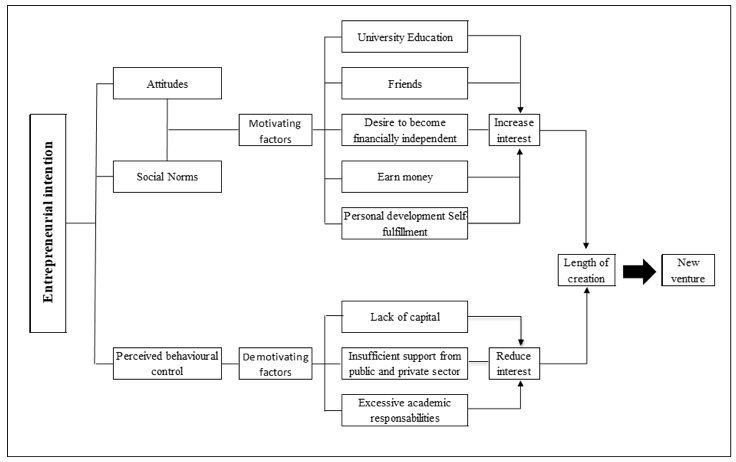
Entrepreneurial intent remains an important part of start-up process and is worthy of attention in its own right. This is why a model is proposed in this study (figure 1) which joins the TPB with the motivational and demotivational factors taken in consideration in this research.
Hence it is the aim of this research to contribute to the current literature by discussing the variables or factors that can influence students’ inclination towards entrepreneurship they will be studied in detail.
Azjen (1991) defined attitude as the degree to which an individual has favourable or unfavourable assessments of the behaviour in question. According to the TPB, individuals who are more flexible about attitudes towards the behaviour would be more likely to try and take the action to become an entrepreneur. They include not only affective (I like it, it is attractive) but also evaluative (it has advantages) considerations (Liñán and Chen, 2009). Social Norms refer to the perceived social pressure to perform or avoid behaviour. It consists of two components: normative beliefs and the motivational to comply with these beliefs (Ajzen and Fishbein, 1980). According to Ajzen (1991) normative beliefs are concerned with the likelihood that important others would approve or disapprove of a behavior, and motivation to comply is an assessment of how important it is to have approval of important others (i.e. family members, close friends and other influential people such as teachers, successful entrepreneurs, enterprise advisors, etc.) which are believed to shape the formation of entrepreneurial intentions (Ajzen, 2002).
The first two factors proposed by Azjen in its TPB, which suggest that attitudes and subjective norms determine intentions are broaden in this study considering the different variables that can play a role in taking the intent to the actual new venture creation (figure 1). These are explains below:
• University education: Mahlberg (1996) agrees the remarks by stating that schools and universities have a key role to play in promoting entrepreneurship since educational institutions are ideally considered the place in shaping entrepreneurial cultures and aspirations among students while they are studying to survive in today’s robust business milieu (Autio, Keeley et al. 1997; Landstrom 2005).
• Family: According to Boy and Vozikis (1994) states that the intentions to become an entrepreneur are stronger as well as the final decision to create a business more probable when there exist social support considering of special importance the role of the family whether it has a business or not.
• Friends: Nanda and Sorensen (2006) acknowledge the role of peers in influencing one’s decision to become entrepreneurs. They suggest that there exist a positive effect transferred by those who have had previous experience in self-employment which have a direct impact on individuals when considering starting a new business or not.
• Desire to become financially independent: Many students would like not to depend on others to support their living expenses and this desire drives them into looking the ways to find its own resources and become independent.
• Earn money: This factor becomes of importance because students would like to increase their standard of living in the short-run and to gain a different social status. Praag and Cramer (2001) found that people would become entrepreneurs if the expected rewards surpass the wages of employment.
• Personal development / Self-fulfillment: According to Maslow (1943) individuals will feel they are successful when they can realize that have reached their goals.
It is unbelievable to think that in order for a person to have the motivation to become an entrepreneur, all the above factors have to be reached. On the contrary, the intentions will depend on other factors that could reduce its level of motivation. This is where the third component of the TPB takes place
known as Perceived behavioural control. More specifically, this construct refers to the perceived ease or difficulty of performing the behaviour (Tkachev and Kolvereid, 1999). In the model proposed (figure 1), three variables like lack of capital, insufficient support from the public and private sector and the excessive academic responsibilities might become a factor of demotivation which reduces the interest of becoming an entrepreneur.
As it has been explained above, there are many factors that could lead university students to have the intention to create a new venture. Therefore the purpose of the current study is to analyse the entrepreneurial intention of universities students in Milagro, Ecuador. In the study, some factors that might have an impact on students’ decision were tested on a sample of 206 University students from a public University considering just ones who are in their last year and belong to the Business Faculty. What is more, the study contributes to the literature by theorizing and empirically testing how some factors affect entrepreneurial intention of university students. It is believed that the results of this study may have some significant implications for the policy makers and educators.
The methodology used in this research is based on a descriptive, cross-sectional study where data was collected, measured and evaluated in order to get relevant information about general aspects of entrepreneurs, the different factors that might influence in a positive or negative way at the moment of deciding whether to start a business or not. The research techniques used was the bibliographical revision and surveys which were administered to a sample of 206 students from the last two semesters considering the five careers options that the Business Faculty offers. To collect data a survey was carried out based on questionnaire of 18 questions which were grouped into six criteria: Criteria 1, Intention to start a business; Criteria 2, Length to start-up; Criteria 3, influence of university education; Criteria 4, external factors; Criteria 5, factors that motivate students to start a new venture; Criteria 6, demotivation factors that stops students to launch their own business.
The scales used in the questionnaire implemented are based taking as a reference the contributions of Tarapuez et al., (2015) in their study “Elements for building an instrument to measure entrepreneurship in last term bachelor students”.
In order to study the different criteria that may influence in a positive or negative way the student’s intention toward starting a business or not, different tables were created which grouped all the criteria into four factors: Individual, external, motivational and demotivational.
The first factor to analyse has to do with the individual about its intentionality to start a business and how long it could take before this happen (Table 1). It was found that a great majority of student have the desire to start a business representing the 87%. Another important factor to consider are those students who already own a business which is about 7% and the 6% of them who have no intention to launch or start entrepreneurial activities. Perhaps this last portion of students feels more secure just to find a job and earn quick money.
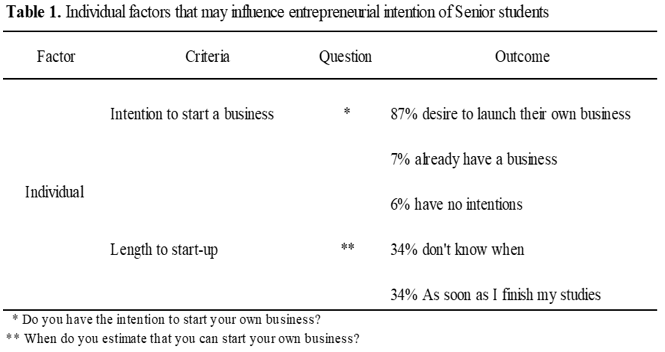
Also of importance is the length to start-up because there was no significance difference between students who want to start a new business as soon as they finish their studies and those who have no idea when to start.
Having the intention is very important to take the risk of starting a new business, but there might be other factors that help students to be involved in business somehow. This can be called external factors shown in (Table 2)
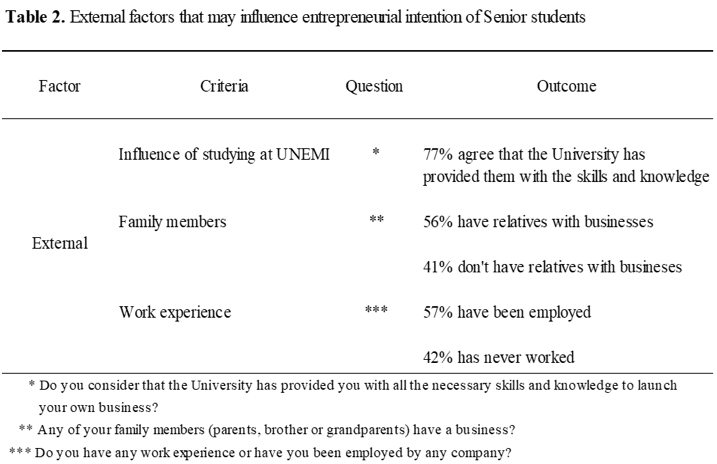
It can be observed in the above table that the majority of students 77% agree that University has provided them with the enough skills and knowledge to start a business which validate that Universities are playing its role of forming entrepreneurs.
Table 2 also shows that there is not a great difference between those students who have relatives with businesses and those who don’t. Still, 41% is a great number to consider because it might explain why many students have the resistant toward entrepreneurship due to they have nobody in their family to follow as an example. Another important issue to take in consideration is about its work experience because even though the portion of students with work experience is higher by 15%, it is important to remark that 42% is also a big number that need to be paid attention and find somehow the way these students start practicing what they learn in their classroom.
Become an entrepreneur can take a long way, so feeling motivated play an important role for not giving up in the short-run. The next table (Table 3) analyses those factors that keep student going in their dreams to become successful entrepreneurs.
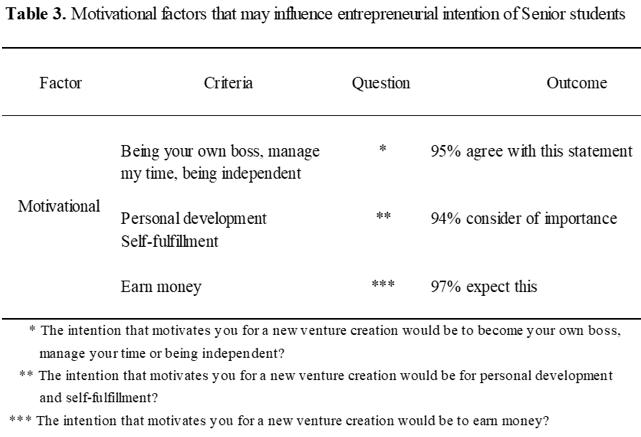
The majority of the students, 95% see as positives factors the possibility of being its own boss, manage their own time and being independent. All these three variables should be useful to understand that being entrepreneurs could bring great benefits in the long-run. The 94% of students confirm what is known as the Maslow theory (1943) which suggests that individuals, in this case students; will feel motivated to reach the top of the pyramid where they reach their self-fulfillment.
Earning money is the top factor for students in their intention to start a business representing the 97%. This might be the main cause why many entrepreneurship projects fail because they expect money in the short-run, however there exist evidence from successful entrepreneurs who suggest that it is a process and that might take several years before money can be actually earned, in many cases, they need to lose money or reinvest what they earn gradually.
Finally and according to the model proposed in the literature, three aspects that could demotivate students to start a business are: Lack of capital, insufficient support from public and private sector and excessive university responsibilities. All these are presented in table 4.
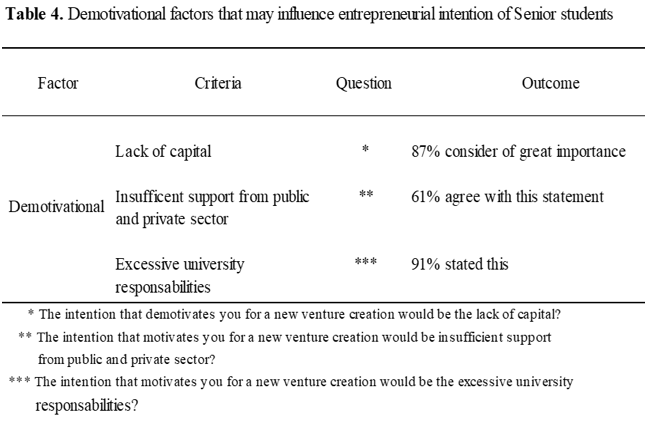
The money is always an engine to do many things. In this study, 87% of the students considered of importance. However this could be overcome if they understood the mechanism to get access to loans. There also exists the perception among students that there is insufficient support either from public or private sectors to support them with their project ideas.
Another thing to consider is the time that students spend during their whole career which may be an advantage for them to launch a business; however the 91% of them agree that they have excessive university responsibilities which not let them to work in other activities.
The results obtained in this research highlighted the entrepreneurial intention of universities students of the last two semesters of the Business Faculty. It was found that there exist a great percentage of students who desire to launch their own business; however some of them have not decided yet when to start even though they agree that the University is providing them with the knowledge and skills. It needs to be considered in future research the different aspects that stop this proportion of students to start their business.
I would also be a good contribution if Universities could connect those students who have relatives with businesses or work experience with those who still need to put theory into practice. That would be of great impact since the study shows that the majority of the students feel motivated to start a new venture for reasons like being their own boss, personal development and self-fulfillment.
Additionally, the faculty has to start different campaigns to promote entrepreneurship among students starting form the first years to allow them to learn step by step and getting an entrepreneurial viewpoint in relation with other students who can exchange experiences and share knowledge.
It is also of importance to make different workshops which explain students all the mechanism that exists to get financial support from the public and private sectors. This could help them for not feeling demotivated at the moment of starting a business and not having the enough capital.
Furthermore, it could be great if the students could do more visits or internships in different businesses, especially little entrepreneurs where they can learn about the dreams and the struggle to keep going to get successful. Also, it would be of great impact to include during their whole university life more courses which train them not only in the abilities and skills to start a business, but once the business is running how to make it grow with different marketing strategies.
Finally, this research has showed that there exist a great entrepreneurial capacity among university students who seem eager to take the risk and start their own businesses and that is why Universities need to keep playing an important role in forming this kind of students who are crucial to boosting productivity, increasing competition and innovation, creating employment and prosperity, and revitalizing communities.
Ajzen, I. (1991). The Theory of Planned Behaviour, Organizational Behaviour and Human Decision Processes, 50 (2), 179-211.
Ajzen, I. (2002). Constructing a TpB questionnaire: conceptual and methodological considerations. Retrieved from: http://www.uni-bielefeld.de/ikg/zick/ajzen%20construction%20a%20tpb%20questionnaire.pdf
Ajzen, I. & Fishbein, M. (1980). Understanding Attitudes and Predicting Social Behavior. New York, USA: Prentice-Hall
Autio, E., Keeley, R.H., Klofsten, M., Parker, G.G.C. & Hay, M. (2001). Entrepreneurial intent among students in Scandinavia and in the USA. Enterprise and Innovation Management Studies, 2 (2), 145-60.
Autio, E., Keeley, R., Klofsten, M., Ulfstedt, T. (1997). Entrepreneurial intent among students: Testing an intent model in Asia, Scandinavia and USA. Frontiers of Entrepreneurship Research 17: Babson College/Kauffman Entrepreneurship Research Conference, Centre for Entrepreneurial Studies, Babson College, Wellesley.
Béchard, J. & Toulouse, M. (1998). Validation of a didactic model for the analysis of training objectives in entrepreneurship. Journal of Business Venturing, 13 (4), 317-332.
Bird, B. (1988). Implementing entrepreneurial ideas: the case for intentions. Academy of Management Review, 13 (3), 442-53.
Boy, N. & Vozikis, G. (1994). The influence of self-efficacy on the development of entrepreneurial intentions and actions. Entrepreneurship Theory and Practice, 18 (4), 63-77
Douglas, E.J. & Shepherd, D.A. (2002). Self-employment as a career choice: attitudes, entrepreneurial intentions, and utility maximization. Entrepreneurship Theory and Practice, 18 (3), 5-10.
Engle, R., Dimitriadi, N., Gavidia, J., Schlaegel, C., Delanoe, S., Alvarado, I.,… Wolff, B. (2010), Entrepreneurial intent: a 12-country evaluation of Ajzen’s model of planned behavior. International Journal of Entrepreneurial Behaviour and Research, 16 (1), 35-57.
Fayolle, A., Gailly, B. & Lassas-Clerc, N. (2006). Assessing the impact of entrepreneurship education programmes: a new methodology. Journal of European Industrial Training, 30 (9), 701-720.
Galloway, L. & Brown, W. (2002). Entrepreneurship education at university: a driver in the creation of high growth firms?. Education + Training, 44(8/9), 398 - 405.
Gartner, W.B., Shaver, K.G., Gatewood, E.J. & Katz, J. (1994). Finding the entrepreneur in entrepreneurship. Entrepreneurship Theory and Practice, 18 (3), 5-10.
Gorman, G. & Hanlon, D. (1997). Some research perspectives on entrepreneurship education, enterprise education and education for small business management: a ten-year literature review, International Small Business Journal, 15 (3), 56-78.
Henderson, R. & Robertson, M. (2000). Who wants to be an entrepreneur? Young adult attitudes to entrepreneurship as a career. Career Development International, 5 (6), 279-87.
Keat, O., Selvarajah, C. & Meyer, D. (2011). Inclination towards entrepreneurship among university students : An empirical study of Malaysian university students. International Journal of Business and Social Science, 2 (4), 206–220
Kolvereid, L. (1996). Prediction of employment status choice intentions. Entrepreneurship Theory and Practice, 21 (1), 47-57.
Kolvereid, L. & Moen, O. (1997). Entrepreneurship among business graduates: does a major in entrepreneurship make a difference?, Journal of European Industrial Training, 21 (4), 154-60.
Krueger, N.F., Reilly, M.D. and Carsrud, A.L. (2000). Competing models of entrepreneurial intentions. Journal of Business Venturing, 15 (5-6), 411-32.
Landstrom, H. (2005). Pioneers in Entrepreneurship and Small Business Research. New York, United States: Springer Science+Business Media, Inc.
Liñán, F. & Chen, Y.W. (2009). Development and cross-cultural application of a specific instrument to measure entrepreneurial intentions. Entrepreneurship Theory and Practice, 33 (3), 593-617.
Mahlberg, T. (1996). Evaluating secondary school and college level entrepreneurial education - pilot testing questionnaire. The Internationalizing Entrepreneurship Education and Training Conference. Arnhem/University of Nijmegen, The Netherlands.
Matlay, H. & Westhead, P. (2005). Virtual teams and the rise of e-entrepreneurship in Europe. International Small Business Journal. 12 (3), 353-365.
Moriano, J.A., Gorgievski, M., Laguna, M., Stephan, U. & Zarafshani, K. (2011). A cross-cultural approach to understanding entrepreneurial intention. Journal of Career Development (in press).
Nanda, R. & Sorensen. J. (2008). Peer effects and entrepreneurship. Retrieved from http://hbswk.hbs.edu/item/peer-effects-and-entrepreneurship
Praag, C.M. and Cramer, J.S. (2001). The roots of entrepreneurship and labor demand: individual ability and low risk. Economica, 68 (269), 45-62.
Schaper, M. & Volery, T (2004). Entrepreneurship and small business: A Pacific Rim perspective. Queensland, Australia: John Wiley and Sons Australia Ltd.
Shapero, A. & Sokol, L. (1982). The social dimension of entrepreneurship. In Kent, C.A., Sexton, D.L. & Vesper, K.H. (Eds), Encyclopedia of Entrepreneurship: 72-90. New Jersey, United States: Prentice-Hall, Inc.
Tarapuez, E., García, M., Castellano, N. (2015). Elements for building an instrument to measure. Tendencias. 16 (2), 209-227. Retrieved from: file:///C:/Users/Familia/Downloads/Dialnet-ElementosParaLaConstruccionDeUnInstrumentoQuePermi-5204608.pdf
Tkachev, A. & Kolvereid, L. (1999). Self-employment among Russian students. Entrepreneurship and Regional Development. 11 (3), 269-80.
1. Mechanical Engineer, Master in Business Administration. Professor at the University of Guayaquil. Email: francisco.duquea@ug.edu.ec , fjda1972@gmail.com
2. Chemical Engineer, Magister in Integrated Systems of Quality, Environment and Safety. Professor at the University of Guayaquil. Email: emma.pazang@ug.edu.ec
3. Professor at the State University of Miracle. Email: walvarezb@unemi.edu.ec